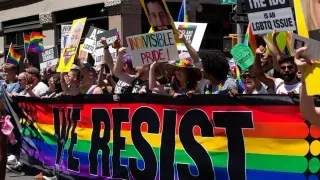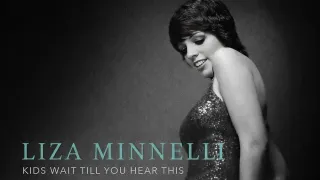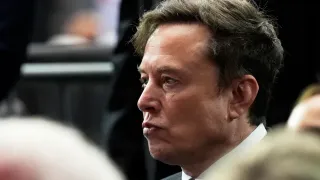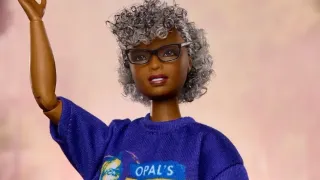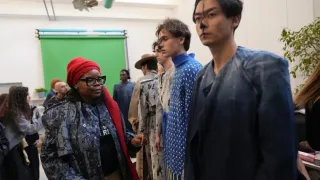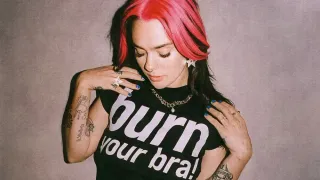September 30, 2017
SF Film Series Links Gay Generations
Seth Hemmelgarn READ TIME: 4 MIN.
Seeking to bridge the gap between generations of gay men, filmmaker David Weissman is coming to San Francisco to screen episodes of his new series, "Conversations with Gay Elders."
Weissman, a gay man who co-directed the documentary "The Cockettes" (2002) and directed "We Were Here" (2011), said in an email that "Conversations" is "a cross-generational collaboration, in which I have worked in partnership with gay men in their 20s and 30s as editors to profile gay men in their 70s and 80s."
Thursday, October 5, Weissman will screen the first episode, which features longtime San Francisco philanthropist and political activist Robert Dockendorff. Dockendorff will join Weissman and queer filmmaker Alex Bohs, who edited the episode, for a post-screening discussion. The event runs from 6 to 8 p.m. at the San Francisco Public Library's Koret Auditorium, 100 Larkin Street (https://sfpl.org/index.php?pg=1029088601).
Weissman, 63, said in an interview that the project evolved "to some degree out of the experience of 'We Were Here,'" which covered San Francisco's AIDS epidemic. He said that film helped him realize that "older and younger gay men don't do a great job of communicating with each other."
Much LGBT history "is going to be lost when the pre-Stonewall generation is no longer going to be here," said Weissman.
"My own mother and grandparents died when I was relatively young," he said, and as he got older, he had questions about his family history, particularly about the Holocaust, but there was "nowhere to go for answers."
"Part of what I realized is that as one gets older, one develops more questions, and more mature questions, and yet sometimes the people who can answer those questions are no longer around," said Weissman, a former San Francisco resident.
Dockendorff, 78, a Vietnam veteran who once served as the president of the Harvey Milk LGBT Democratic Club, among other achievements, said he's worked with Weissman "many times before," and when Weissman asked him to participate in this project, "I very well couldn't say no."
One topic Weissman had in mind for "Conversations" was "as you get older you still have sex," said Dockendorff, so "the film itself is probably R-rated."
But he said they also talked about his work in the community through the years, and what he anticipated seeing in the future.
"My parting massage was 'Beware, there are lots of people out there that still hate us,'" Dockendorff said, and he urged people to support LGBT nonprofits.
"Boy was it more prophetic than what we thought at the time," he said of his message, which was recorded in 2016, before the election of President Donald Trump.
Dockendorff said "Conversations" is "a worthwhile project for younger people to see what my generation faced, and of course a generation before me. As you go back in history, gay people have adapted to the time and built on the past, and that's what we continue to do as each generation will hopefully improve things for the next generation."
On his website, Weissman wrote, "Many gay elders who survived AIDS avoid talking about the past because there is frequently so much pain involved, combined with a fear that talking about the past makes them seem old. Many young men do have curiosity about the lives of those who preceded them but don't know how to ask or know what may be inappropriate or insensitive."
Bohs, 26, who edited the episode that features Dockendorff, expressed similar sentiment in an interview.
"I was always kind of nervous to talk to older gay guys," he said, largely because he was afraid of seeming "immature."
But working on the project has been "such an amazing experience," said Bohs, who lives in Los Angeles. "It's so cool. Now I have friends from all different generations, specifically gay men, which is kind of rare."
Bohs contacted Weissman through Facebook a few years ago after he saw "We Were Here," and they kept in touch. Then, Weissman called him about "Conversations."
The young editor said he wants the project "to open up the floor to more conversations like this ... .We can learn so much from each other."
Referring to the June 2016 massacre at the gay Pulse nightclub, where 49 people were fatally shot, Bohs said, "The last screening we did was right after the Orlando shooting," and he said he felt "completely lost."
He recalled that Dockendorff bolstered him and told him, "Keep up your vigilance."
Bohs said the biggest lesson he got from working with Weissman was, "Don't rush." He said that in many of the projects he's done, "you want to get your point across really quickly." But with Weissman, "he was like, 'No we've got to let this breathe and let this come about naturally and organically."
"At first I fought him on it," Bohs said, but then he realized he was working with "real conversations with real pauses. ... It was less about a flashy piece of film and more about having an organic conversation."
The second and third episodes of "Conversations" will be screened October 12 at Yerba Buena Center for the Arts (https://www.ybca.org/whats-on/conversations-with-gay-elders and October 26 at the Contemporary Jewish Museum (https://www.thecjm.org/programs/202), respectively.
